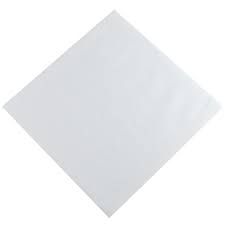napkin
英 ['næpkɪn]
美 ['næpkɪn]
CET4 TEM4 考 研 CET6
napkin 餐巾布,餐巾纸来自拉丁语mappa,布,词源同map,-kin,小词后缀。引申词义餐巾布,餐巾纸。
- napkin
- napkin: [15] Latin mappa meant ‘cloth’ (it is the source of English map). As it passed into Old French its m became transformed into an n, producing nappe. This was borrowed into English as the long-defunct nape ‘cloth’, which, with the addition of the diminutive suffix -kin, has bequeathed napkin to modern English. The abbreviation nappy dates from the early 20th century. From derivatives of Old French nappe English also gets apron and napery [14].
=> apron, map - napkin (n.)
- late 14c., "a table napkin," from nape "a tablecloth" (from Old French nape "tablecloth, cloth cover, towel," from Latin mappa; see map (n.)) + Middle English -kin "little." No longer felt as a diminutive. The Old French diminutive was naperon (see apron). The shift of Latin -m- to -n- was a tendency in Old French (conter from computare, printemps from primum, natte "mat, matting," from matta). Middle English also had naperie "linen objects; sheets, tablecloths, napkins, etc.;" also, "place where the linens are kept."
- 1. He wiped away the blood with a paper napkin.
- 他用纸巾将血迹擦去。
来自柯林斯例句
- 2. Michael mopped up quickly with his napkin.
- 迈克尔迅速用餐巾将其揩干。
来自柯林斯例句
- 3. He dabbed at his lips with the napkin.
- 他用餐巾拭了拭嘴唇。
来自柯林斯例句
- 4. Mary Ann tore the edge off her napkin.
- 玛丽·安撕掉了餐巾的边儿。
来自柯林斯例句
- 5. He dabbed at the spot on his tie with a napkin.
- 他用餐巾快速擦去领带上的污点.
来自《简明英汉词典》
[ napkin 造句 ]
